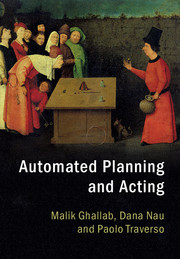Book contents
- Frontmatter
- Dedication
- Contents
- List of Algorithms
- Table of Notation
- Foreword
- Preface
- 1 Introduction
- 2 Deliberation with Deterministic Models
- 3 Deliberation with Refinement Methods
- 4 Deliberation with Temporal Models
- 5 Deliberation with Nondeterministic Models
- 6 Deliberation with Probabilistic Models
- 7 Other Deliberation Functions
- 8 Concluding Remarks
- Appendix A Search Algorithms
- Appendix B Strongly Connected Components of a Graph
- Bibliography
- Index
7 - Other Deliberation Functions
Published online by Cambridge University Press: 05 August 2016
- Frontmatter
- Dedication
- Contents
- List of Algorithms
- Table of Notation
- Foreword
- Preface
- 1 Introduction
- 2 Deliberation with Deterministic Models
- 3 Deliberation with Refinement Methods
- 4 Deliberation with Temporal Models
- 5 Deliberation with Nondeterministic Models
- 6 Deliberation with Probabilistic Models
- 7 Other Deliberation Functions
- 8 Concluding Remarks
- Appendix A Search Algorithms
- Appendix B Strongly Connected Components of a Graph
- Bibliography
- Index
Summary
As discussed in Section 1.3, there is more to deliberation than planning and acting. This point is particularly clear in robotics, as shown in the survey by Ingrand and Ghallab [294]. Here,we briefly cover a few deliberation functions, other than planning and acting, that may be needed by an actor.We discuss in Section 7.1 deliberation on sensing tasks:how to model them and control them to recognize the state of theworld and detect objects, events, and activities in the environment that are relevant to the actor, for and while performing its own actions. Section 7.2 is about monitoring and goal reasoning, that is, detecting and interpreting discrepancies between predictions and observations, anticipating what needs be monitored, controlling monitoring actions, and assessing the relevance of commitments and goals from observed evolutions, failures, and opportunities. Learning and model acquisition techniques in planning and acting are surveyed in Section 7.3; we cover in particular reinforcement learning and learning from demonstration approaches.
This chapter surveys also approaches for handling hybrid models that have continuous and discrete components (Section 7.4), which are needed in domains where part of the dynamics is naturally expressed with continuous differential equations.We finally devote Section 7.5 to representations for expressing ontologies, which can be essential for modeling a domain; we discuss their use in planning and acting.
PERCEIVING
Deliberation is mostly needed for an actor facing a diversity of situations in an open environment. Such an actor generally has partial knowledge about the initial state of world and its possible evolution. It needs to be able to perceive what is relevant for its activity and to deliberate about its perception, while acting and perceiving.
Reasoning on perception leads to several problems,among which for example those of:
• Reliability: how reliable are sensing and information gathering actions? What verification and confirmation steps are needed to confirm that the sensed value of a state variable is correct? How to assess the distribution of values if uncertainty is explicitly modeled?
• Observability: how to acquire information about non observable state variables from the observable ones? How to balance costly observations with approximate estimates?
• Persistence: How long can one assume that a state variable keeps its previous value as long as new observations do no contradict it?
- Type
- Chapter
- Information
- Automated Planning and Acting , pp. 276 - 309Publisher: Cambridge University PressPrint publication year: 2016



